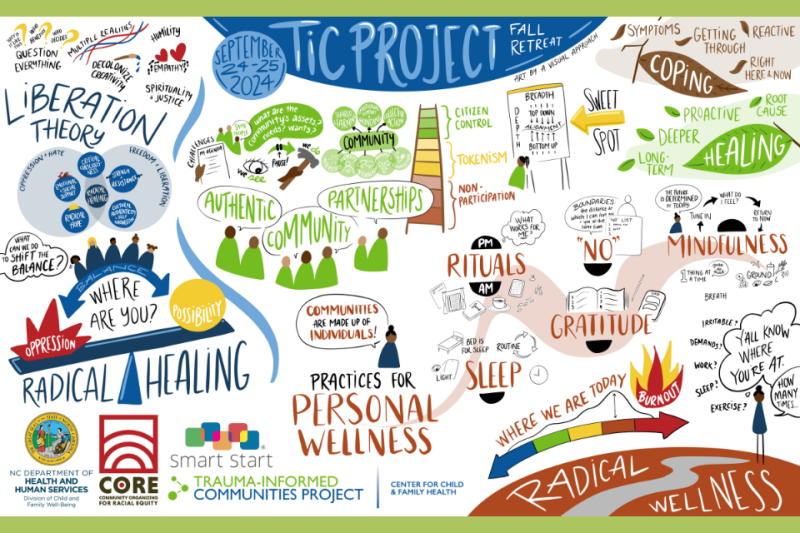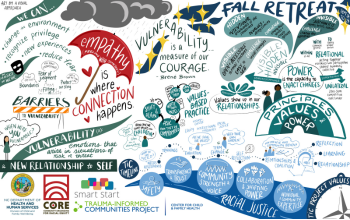
The North Carolina Trauma-Informed Communities (TIC) Project team held a fall retreat at the Trinity Center in Pine Knoll Shores, North Carolina, on September 23-25.
The gathering was an opportunity for those working in the trauma-informed space to elevate their equity-focused, community-led approaches and to build community and enhance connection amongst themselves through relational power and restorative justice practices.
The retreat brought together 33 members of System of Care Collaboratives and coalitions from across the state that focus on trauma, resilience, and/or positive and adverse childhood experiences (PACES/ACES). These groups are doing work focused on trauma-informed, systems-focused care in their communities. Twelve North Carolina counties were represented: Ashe, Bladen, Brunswick, Chatham Columbus, Durham, Hoke, Moore, New Hanover, Orange, Watauga, and Wilkes.
What is the Trauma-Informed Communities Project?
The TIC Project promotes community-led and community-driven efforts to support children, families, and providers who have experienced trauma and/or support those who have experienced trauma. The project strives to develop a comprehensive, racially equitable, community-led, trauma-informed, and healing-centered response for children, families, and communities across the state. Essential to this mission is the explicit acknowledgement that racial equity and social justice is trauma-informed care.
Since 2018, the project team has worked alongside communities to build on strengths, identify and address barriers, shift to a learning/growth mindset, and move toward sustainable and community-led practices. The TIC Project is a resource for community members, community coalitions, and service system providers who wish to engage more effectively in systems- and practice change.
Through paradigm-shifting workshops, consultation, and community gatherings, the project models healing-centered and restorative justice methods. It also creates space for leaning into shared values, learning and unlearning, building authentic relationships, and sharing knowledge to overcome barriers to change.
The TIC Project is a collaboration of the Center for Child and Family Health (CCFH) the Duke Psychiatry & Behavioral Sciences’ trauma-focused team, and Community Organizing for Racial Equity (CORE).
A Time for Learning, Reflection, and Nourishment
The project team led four sessions on topics that included vulnerability and trust; values, power, and liberation; radical healing and wellness; and authentic community partnership. Participants also met in small groups with others from the same region to discuss needs and opportunities and collaborate on action steps specific to their community. The retreat allowed participants to reimagine sustainability while nourishing themselves for the work moving forward.
A number of participants shared positive feedback about the retreat. Here are a few select quotes:
“[The retreat] reinforced my understanding of how strong the cultural and historical forces are which shape my initial responses to my work and life and so how important it is for me to center my why and my values and to reflect and center relationships in community to counterbalance these forces as I approach my work and life with others.”
“There are very few conferences, retreats, trainings, or professional developments where I walk away feeling more knowledgeable, empowered and ready to get back to work than I did following this retreat.”

Throughout the retreat, Hope Tyson of A Visual Approach listened deeply and recorded each session as illustrations to help tell the story of our time together.
Meet the Team
The TIC project team includes:
- Angela M. Tunno, PhD, MS (Duke Psychiatry & Behavioral Sciences, National Child Traumatic Stress Network, and Center for Child and Family Health)
- Briana Brownlow, PhD (Duke Psychiatry & Behavioral Sciences)
- Stephanie Hargrove, PhD (Duke Psychiatry & Behavioral Sciences)
- Danielle Mearis Harrell, MPA (CCFH)
- Karinda Roebuck, MSN, CNM (CORE)
- Michelle Wright, LCMHC, MPH (CORE)
- Mebane Boyd (NC Partnership for Children)
- Hayley Bayne (NC Department of Health & Human Services, Division for Child & Family Well-Being)
- Terri Grant, MPPM (NCDHHS, Division for Child & Family Well-Being)
The TIC Project is made possible through support from the NC Division for Child & Family Well-Being.